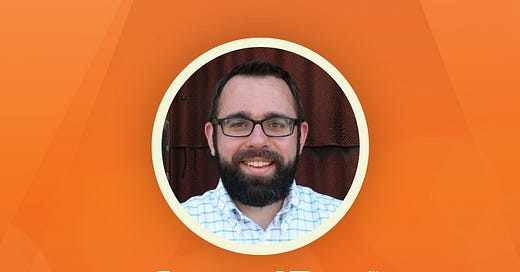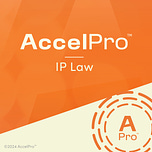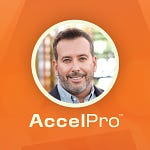Listen on Apple Podcasts, Spotify and YouTube.
You’re invited to join free coaching sessions on navigating your career. How do you build productive relationships with clients? Are you considering moving from a firm to an in-house counsel role? Invitations to upcoming events are coming soon.
Welcome to AccelPro IP Law, where we provide expert interviews and coaching to accelerate your professional development. Today we’re featuring a conversation about standard essential patents and the transportation industry. Our guest is Chris Storm, Legal Director, Intellectual Property at Uber.
Standard essential patents (SEPs) play an essential role in the transportation ecosystem. These patents, which cover innovations fundamental to achieving technical standards, help ensure interoperability and consistency across diverse technologies. Due to their importance, a set of legal and economic frameworks have grown around SEPs.
Chris Storm is Uber’s Legal Director, Intellectual Property, where he oversees IP strategy and protection for Uber. He previously worked as assistant general counsel at Bell Helicopter and as an associate at Baker Botts LLP. Storm speaks and writes frequently about topics related to IP licensing.
In this interview, Storm discusses SEPs, the transportation industry and related topics, including non-competes and legal frameworks for interoperability. The episode transcript and supplemental materials are available below.
Listen on Apple Podcasts, Spotify and YouTube.
Interview References:
1:58 | Uber Elevate. Uber Technologies Inc. (2023).
11:53 | Allied Security Trust (AST). (2023).
Supplemental Materials:
Storm, Christopher S. . Measuring the Inventor's Contribution, 21 U.N.H. L. Rev. 167 (2022).
Henry, Michael K. (January 31, 2019). Crafting An Effective Patent Strategy: How Uber Built Its Portfolio. Henry Patent Law Firm.
Wingrove, Patrick. (September 4, 2020). How auto companies make IP strategies that suit their needs. ManagingIP.
TRANSCRIPT
I. Standard Essential Patents and Valuations
Neal Ungerleider, Host: Can you tell us a bit about your background?
Chris Storm: Certainly. So I've been with Uber for almost seven years now. Prior to that, I started off my career at a law firm; Baker Botts. And then I was in-house at Bell Helicopter for about four years, before joining Uber.
I originally joined Uber as the head of IP for self-driving. At one point I was the head of all legal for self-driving, Uber Elevate, and any other emerging technology programs at Uber. Lots of great stories there. And then when the pandemic hit, I helped Uber sell off many of these business units: the self-driving program, Uber Elevate and so forth.
And since that time I've been working on a number of initiatives for Uber: bringing self-driving vehicles to our network, IP policy, managing some IP litigation; a number of different things since then.
NU: What are some of the big questions around litigation of standard essential patents?
CS: That's one of the hottest topics in the IP world. The questions that I tend to focus on are on the valuation side. And more specifically, what value are standard essential patent holders entitled to capture through licensing? What value are they not entitled to capture?
If you consider the transportation space, a very common fact pattern is to have a multi-tier supply chain. Where the in-device manufacturer is the one being targeted for licensing. But they buy a communications module from a company that buys, say, a cellular chip from their supplier. And so the question is: As each supplier adds value to that chip, how much of that value is the patent order allowed to capture?
In the US, the answer should be fairly straightforward, because we have doctrines like apportionment that says that you're not allowed to capture value outside of the scope of your invention. Additionally, we have doctrines that say you're only entitled to reasonable royalties to the extent you suffered damages. And so, damages or compensation for your loss, due to the infringement.
Outside the US though, those restrictions don't really exist. So in other countries - we'll focus on Europe - you're allowed to capture the value of the infringed profits. The US doesn't allow that. Congress banned that type of value from being captured in 1946 but that's still the case in many countries in Europe. So there, they value standard essential patents very differently than we would, here in the US.
Understanding those differences is important, because most standards are licensed internationally. And in fact, you have some countries setting international license rates, based on their understanding of what value can be captured. And that tees up some of the conflicts between different countries, and the tug of war over who gets to set those rates. Because they're really fundamentally debating which country's approach to valuation is the one that should apply globally.
NU: For standard essential patent disputes: Are there substantial differences between intra-industry disputes versus cross-industry disputes?
CS: That's a great question. Typically - if you weren't thinking about any particular industry, any particular standard - the way you would expect standard setting to go is: companies get together to define a standard. And they're all going to use that standard, and then they license each other.
Most standards generally only have applicability within the industry. But that's not always the case. So in the cellular world, you have a situation where one industry - the telecommunications industry - sets the standard. But then they license other industries.
And that's what we're seeing now, in the Internet of Things. Licensing programs where they license the auto industry, or they license companies that make sensors. They make companies, license companies, to make drones or what have you. The number of industries really impacted by IoT licensing is endless, right? So as a practical matter, it makes a big difference. Because none of those companies, A: none of them, participated in standard setting. B, because you have one industry defining a standard, and then adopting a standard; it leaves no alternatives.
So if you're an automaker, if you want to have any sort of connectivity that isn't close range like WiFi or Bluetooth is, then you have to go cellular. It's really the only option right now. That means you have to buy cellular chips and you have to step into a licensing framework that was created by a different industry.
What happens is that you have one industry that can collect revenues from many other industries. It's still “early days” on that. We see it played out in the auto industry with 4G. But we haven't seen - at least not publicly - how that is playing out in all the other IoT spaces. And what’s the fallout from that? That remains to be seen. But it's certainly very different than other standards - where the standard setters license each other, and take care of everything within their industry - so that any follow-on activity that exists outside the industry? The patents aren't really an issue, because exhaustion applies.
NU: With the Federal Trade Commission proposing a rule to ban non-compete clauses, can you tell us a little bit about the concerns and challenges for companies in terms of trade secret protection?
CS: The FTC action is on its face, not directed towards the trade secret landscape. It's solely towards non-compete clauses.
As a practical matter though, there are two sides of this issue. One is non-compete clauses; some say exist to help employers protect their trade secrets. If I can keep that employee from going to another company that works in a similar area, then I don't run the risk of that employee telling my competitor the secrets of my operation.
On the flip side: From an employee perspective, obviously there are problems with non-competes that the FTC is interested in addressing, but they are coupled with trade secrets. Even if there's no contractual non-compete, the threat of a trade secret assertion still exists. And they can go after your employer; they can go after you. And it's really difficult for an employee to figure out what the right thing to do is.
There's no intent requirement. If you learn information from your former employer, you share that information. Even if you think that it's know-how, even if you think that it's your skills, there's still a chance that could be categorized as the trade secret of your employer. There's a lot of nuance in how you define a trade secret.
Is it is an approach for performing the method of X, the fact that you learned how to do it? It could be their proprietary method. But even if it's not, the fact that they do it is also a separate trade secret; the fact that your former employee does it that way. And so it's a difficult minefield for employees to navigate.
What's even trickier though, is when you address non-competes without addressing trade secrets. So you've given employees the feeling like, “Oh, I'm not under a non-compete. That means I can go to a competitor.” But the trade secret risk is still there, and the trade secret risk is not one that is as well advertised. You don't see a clause that's in your contract that actually talks about and explains how trade secrets can be used against employees.
My fear is that you have employees start moving more because they're not subject to non-competes, only to later find out that there's this trade secret risk. And so, if they don't create some trade secret exceptions, then some employees are going to get themselves in a lot of trouble. Or the employees who know that this is an issue will not go to a competitor, even though the FTC is saying they can. So it may not achieve the objectives that they're trying to achieve.
—
II. IP Strategies
NU: From your POV, what are some of the most important questions around IP strategy for transportation?
CS: Transportation companies come in all shapes and sizes - and more importantly, different points in their commercial lifecycles.
This is a very individualized subject. If you are in the traditional supply chain, the difference between being OEM versus Tier One versus Tier Two, you're gonna have different objectives. If you're at an emerging company; if you're working on self-driving or drones or VTOLs or so forth, you're gonna have a strategy that's different than some of the legacy players.
The commonalities there are: You start with business goals. You don't start with patent goals. If you're setting goals around the number of patent applications you file or the size of the portfolio, you're probably not thinking hard enough about the business goals. It's good to go through the exercise of thinking about “What am I trying to accomplish with the resources I've been granted?” Whether it's dollars, whether it's time, and so forth - and identify the high level business goals.
If you're trying to protect yourself against assertions, if you're trying to protect your differentiators, if you're in the supply chain - and yes, you've got contractual protection that your customers or your lenders aren't gonna use your IP - it's even stronger when you have a patent sitting behind that. So are you filing for that reason? Are you filing for collaboration? Are you sending a message to investors? Are you trying to just put filings out there to create prior art so that you have freedom to operate later? You start listing through those goals - and then, all strategy is resource constrained.
So you don't wanna over-invest on any of those goals. And so, that's how you measure yourself; how are my filings tracking to achieving those goals? And then, those example goals that I listed can't all be achieved through patent filing. I'll give you a couple examples just on defending yourself against assertions.
There are, of course, non-practicing entities, who your patents don't help you, right? And that's when you start supplementing your strategy with, “Okay, maybe I need to be more proactive. I need to join Allied Security Trust, so that I can license patents before they hit the secondary market. Maybe I need to join the License on Transfer network, so that I get a license as soon as larger players sell off their portfolios to non-practicing entities. Right? Protect myself that way.”
But you also have companies who, if they already hold the patents, maybe they are an operating company but they operate in a different space than you. So there's a number of companies who, the last couple decades, everybody's, the patent world is all about blue sky filings.
So even if your company does one thing, you filed in a number of different areas. You may even have an R&D team that files on businesses that you never plan on going into. For a new company entering into a space? What that means is they've got patents; blue sky filings on the space that I'm actually building my business in that I have to worry about.
But my organic filings, which are focused on that business, will never read on their products because they're not actually commercializing there as well. Yeah, I can file patents, but they're never going to infringe them. And therefore, I can never use it to negotiate a deal with those companies. So then the question is: How big of a risk is that? Should I go purchase patents? Do I need to buy patents in spaces where my engineering teams aren't building, to make sure I'm protected in those areas? It's different for every company; the risks are different. Every company has different resources and some of those risks are bigger for some than others.
But from a strategy perspective, you can start with your own portfolio. It's a nice efficient way to check the box on a number of these different goals, and then look outside your portfolio to see, “What do I need to do to make sure that other business goals are also achieved?”
—
III. Career Background
NU: I was also curious about your own career. Were you always planning on IP law?
CS: I was before I knew what IP law was. When I was in college, I had never met a lawyer in my life. Growing up, I was a courier in college and so that's how I got to know people who were going to law school. And they said, “You should go to law school. You have an engineering degree. You should be a patent attorney.” I didn't even know what a patent attorney did. But once I decided I wanted to do something different than engineering, it was a natural consequence. People just keep telling you, “You should be a patent attorney.”
And you fight it for a while. You say, “No, everybody's telling me to do X. I don't wanna do it. I'm gonna go do some other kind of law.” So, I thought I was gonna be a tax attorney, or - and then I stopped fighting it, and became a patent attorney. For me, once that decision was made, though; you can specialize within patent law. And I think the part of me that was always hesitant about becoming a patent attorney made sure that I didn't overspecialize within patent law. And so, I think that's probably what changed my career a little bit, is making sure that I could do more than one thing.
NU: And what would you say the biggest differences are being in-house versus working at a firm?
CS: So the reason why I wanted to go in-house - I think this proved to be true - is to be closer to the ultimate decision making. These days more than ever, some of the biggest decisions that need to be made - whether it's on a litigation matter, whether it's an M&A deal, whether it's what have you - those decisions are either made entirely in-house, or in-house in consultation with outside counsel.
And if you want to be in the room and you want to be part of the decision making, your best chance is to be in-house. And then, being able to look beyond the matter that's in front of you. And understand, yes, we could take the approach that's being recommended in order to have a better outcome in this particular matter. But what does that do for us overall as a company?
In my current role, I'm also responsible for IP policy. And so, sometimes you have the conversation with outside counsel on a litigation matter, and say, “You're right, that defense is there. But I don't wanna push it. That's inconsistent with the balanced approach to IP policy that we're taking. Yes, we know that's what the law allows us to do, but we don't wanna be out in front of that. We don't wanna push it there. We wanna win in a way that's consistent with our values.” That's the kind of thing that when you're outside counsel, it's harder to make decisions like that. In-house, you have a sense of ownership for the bigger picture, and so that's certainly a difference.
And then, I guess the last thing is efficiency. Good outside counsel will tell you not to spend the money, but that may be on a case by case basis. But to reach the conclusion, I don't need to spend the money on this category of work, full stop. That's something that outside counsel's just not in a position to do, and so I've always been efficiency-oriented to my approach.
I'll tell you the story since we're all here. I was working as outside counsel. I was writing patent applications on things that I was always wondering like, “Why are they paying me to do this? I understand the value of patents overall. But this particular application, I can't figure out how they're gonna get return on value. Whether it's through monetization or commercialization, what have you, why are they doing this?”
And so, I was always a little bothered by what I thought to be a waste of money. And so, I started on a search to figure out, “Okay, what am I missing?” Because I feel like I'm asking a question not many people are asking. And that's what led me to go in-house, is like, I'll get closer to the decision making. And actually be part of deciding what to file and what not to file.
And I got there, and realized that there and other companies and friends that are in-house; like the answers don't get much more profound. Oftentimes, you have corporate goals for every year. And what did you achieve at the end of the year? We filed 75 patent applications. I guess that's great for setting a numerical goal, but why did you need to file 75 and why did you need to file that particular one? It doesn't really answer the questions for me, and so I saw an opportunity.
I thought, “Well, if I can develop an approach to be more efficient and identify what inventions are worth investing in and which ones aren't, that could help me in my career.” I could differentiate myself, right? And so, I decided to go back to school after I was about seven or eight years out of law school. I went back part-time and got into business school, and got a master's in technology commercialization. And I did that because this is a program that is designed for identifying new technologies and assessing their potential for commercialization.
I said, “Perfect. I'm gonna learn that methodology, and I'll be able to look at an invention and say, ‘Yeah, we do wanna invest in it. It has real potential versus no, it doesn't. And I can weed out bad patent filings that way.” And I did learn that, but I learned so much other stuff there. I mean, it just made me realize the true difference between taking a patent view of things versus a technology commercialization view of things. And why it's important to leave money for the other teams, because executing on ideas is really hard, and that's why a lot of companies fail. It's not cause they had bad ideas or inventions, it's because of execution.
So at that point, that's really what kind of changed my in-house practice. And that was around the time I joined Uber. Which was convenient, because at the time, Uber was one of the world's biggest startups. And they were asking me to lead IP for what was essentially a startup within a startup. And having just completed an entrepreneurship program, it was a unique opportunity to bring IP and entrepreneurship under one roof.
I don't know why I've always been focused on efficiency, but it led me on an interesting path to this point.
Listen on Apple Podcasts and Spotify.
This AccelPro audio transcript has been edited and organized for clarity. This interview was recorded on April 13, 2023.
AccelPro’s interviews and products accelerate your professional development. Our mission is to improve your day-to-day job performance and make your career goals achievable.
Please send your comments and career questions to questions@joinaccelpro.com. You can also call us at 614-642-2235.
If your colleagues in any sector of the IP law field might be interested, please let them know about AccelPro. As our community grows, it grows more useful for its members.












